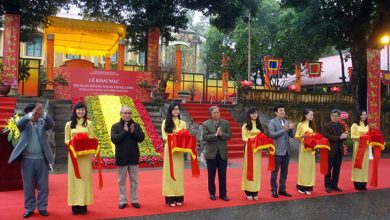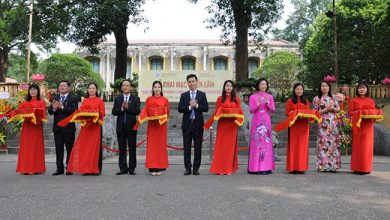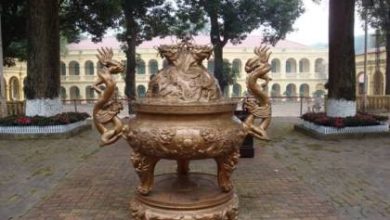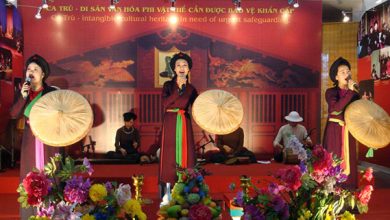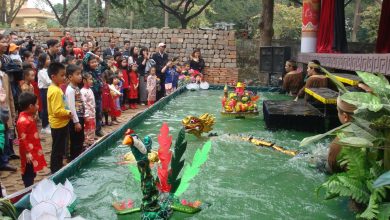Conference on New Archaeological Findings
The Conference is an annual scientific activity of archeologists nationwide. This is a featured event associated with the history of formation and development of archeology in the country over the past half century.
The conference is a scientific forum to disseminate and share research results and new discoveries in the field of archeology to the public. New, potential research in the fields of archeology and science, society and humanities are also discussed. It is the basis for proposed development of projects, strategies, and planning for socio-cultural and economic development of the country and localities.
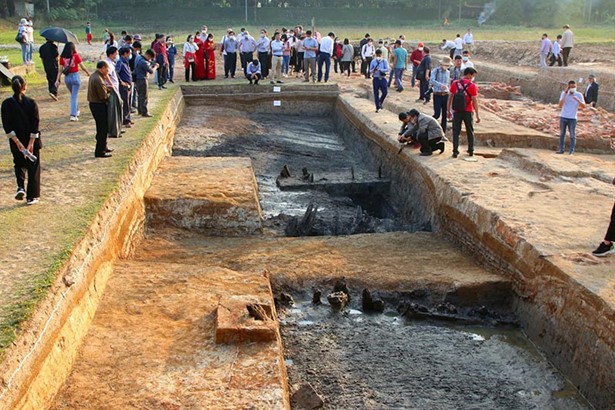
Participants visiting the archaeological excavation pit at Hoa Lư
By convention, the annual Conference on New Archeological Findings is held in the middle of September. This year, however, due to the complicated development of the Covid 19 pandemic, the Conference was held later than usual in a hybrid format of offline and online in Ninh Binh in 3 days from November 29 to December 1, 2021. This event marks the continuous development of Vietnamese archeology during the past 55 years.
In attendance at the opening of the Conference, from the central level, were Assoc. Prof. Trần Đức Cường, Chairman of the Vietnam Association of Historical Science; Assoc. Prof. Tống Trung Tín, President of Vietnam Association of Archaeologists; Assoc. Prof. Nguyễn Đức Minh, Vice President of Vietnam Academy of Social Sciences; Dr. Hoàng Đạo Cương – Deputy Minister of Culture, Sports and Tourism. On the side of Ninh Binh province, there were Mr. Tống Quang Thìn , Standing Vice Chairman of Ninh Binh Provincial People’s Committee, leaders of the Department of Culture and Sports and Department of Tourism. On the side of the Institute of Archeology, there were Dr. Nguyễn Gia Đối, Acting Director of the Institute of Archeology, together with representatives of leaders of central and local departments, agencies and more than 400 delegates who are scientists, archaeologists, and cultural managers across the country attending offline and online.
Speaking at the opening of the conference, Assoc. Prof. Nguyễn Đức Minh – Vice President of the Vietnam Academy of Social Sciences described the Conference as a scientific forum for archaeologists to share their findings and research results, as well as an opportunity for scientists, especially young researchers, to approach and learn from previous generations to improve their scientific research skills. The Vice President of the Vietnam Academy of Social Sciences also highly appreciated the efforts of the Institute of Archeology in bringing the annual Archeology Conference to localities to enhance the visibility of the archeology sector because this was an opportunity for people to get to know more about Vietnamese archeology. In 2021, despite multiple difficulties due to the prolonged Covid epidemic, archaeological activities still took place across the country with new discoveries and research results that are diverse and of great value.
The National Conference on New Archaeological Findings in 2021 were held in Ninh Binh – a province with many historical cultural relics, scenic spots and famous, valuable archeological and architectural monuments that are of great value, such as the Trang An Landscape Complex and Hoa Lu Ancient Capital.
For many years now, leaders of Ninh Binh province have paid special attention to the research, conservation and promotion of cultural heritage values of the province and the nation, which are expected to provide the province with more scientific data and basis for the planning and implementation of economic, cultural and social development goals.
Currently, Ninh Binh province is home to over 1,821 inventoried relics, including 1 world heritage site, 3 special national relics, 388 national and provincial relics, and 5 national treasures of special historical, cultural, and artistic value.
Thanks to the work of scientists, the results of archeological research in Ninh Binh in general and Trang An Landscape Complex over the years have contributed increasingly to the knowledge of Vietnamese history in the first 10 centuries of the history after the common era. They also shed light and add more scientific data on the Dai Co Viet State in the 10th century while confirming traces of human habitation in prehistoric times, which is the basis for establishment of the outstanding universal value of Trang An as a world heritage site under the criteria of culture, scenic beauty and geo-morphology.
Mr. Tống Quang Thìn – Vice Chairman of the Ninh Binh Provincial People’s Committee also shared that the province has been implementing many practical and effective solutions to preserve and promote the cultural and historical values of the land with a focus on archaeological research. He also expressed the province’s hope of receiving continued attention and support of experts and scientists, especially those with deep expertise in the fields of history, culture, archeology, to help Ninh Binh conserve, improve and promoted the historical and cultural values of Hoa Lu Ancient Capital. The leaders of Ninh Binh province believed that the organization of this year’s Archaeological Findings Conference in Ninh Binh would bring about positive effects in historical and heritage awareness while creating social force for economic, social, and cultural development of the province and the country at large.
In his assessment of archaeological research activities nationwide in 2021, Assoc. Prof. Dr. Bui Van Liem – Editor-in-Chief of the Journal of Archeology said that scientific studies have added very new and precious materials to research on the formation and development of the Vietnamese nation, the emergence and evolution of the Vietnamese people. They have also made a worthy contribution to the study, protection, preservation, embellishment and promotion of Vietnam’s historical and cultural values. The scientific documents are evidence to affirm and protect the sacred sovereignty of the Vietnamese nation.
This conference received 375 articles which are new findings on archeology in recent years, including 89 articles on prehistoric archaeology, 201 articles on historical archeology, 57 articles on Champa – Oc Eo archeology, 18 articles on waterborne archeology and 6 articles on joint activities of archaeological research agencies. These new discoveries range from relics to in-depth studies on many issues from Prehistory to History.
After the plenary session, the Conference continued with panel discussion. New and outstanding research findings and results were shared including the discovery of relics that testify to the evolution of humans and cultural relics of Prehistory and Prehistory in Vietnam in some provinces, the continued excavation and research in the area of Kinh Thien Palace at Thang Long Imperial Citadel (Hanoi), new discoveries at Ho Dynasty Citadel (Thanh Hoa), Yen Tu relic site (Quang Ninh, Bac Giang), Cat Tien relic site (Lam Dong) and some Champa cultural relics in the Central Coast region. At the same time, scientists continued with the excavation and scientific dossier formulation of the monument complex of Óc Eo – Ba Thê, Nền Chùa (in the Southern region) under the State-level project led by the Vietnam Academy of Social Sciences.
Thang Long-Hanoi Heritage Conservation Center attended the online conference under the chairmanship of Mr. Director Nguyen Thanh Quang. The results of archaeological excavations of Kinh Thien Palace in 2021 were shared at the Historical Archeology Panel. Scientists were very keen to learn more about these excavation results because this is a major achievement in the study of Thang Long Imperial Citadel during the past 20 years.
The New Archeological Findings Conference is an annual activity. This scientific forum provides an opportunity for professional and non-professional archaeologists across the country to meet and share information about the new findings, new studies. The event also creates windows of opportunities for the cooperation between the Institute of Archeology, universities, museums, heritage sites in archeological research in particular and culture in general.
As part of the conference schedule, scientists visited Hoa Lu ancient capital and Trang An Landscape Complex world cultural heritage site.
Bùi Thị Thu Phương

